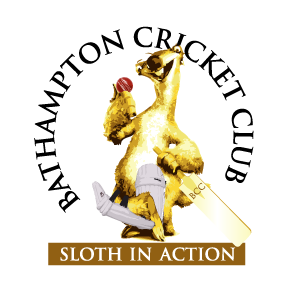After a cool start yesterday, the evening was pleasant as Sloths took to the field to bowl at a largely youthful and keen Guinness eleven. With the summer continuing mostly rain free, the pitch was bound to generate plenty of action, its surface rock hard and scarred from previous encounters. The outfield, too, would provide little resistance to the ball, so a game of incident was assured. And so it proved.
Frith generated catching opportunities immediately, which were duly avoided. Madeye, needing only take a few paces to his left to secure the first of these, proceeded to do a fair imitation of the Dying Swan, the ball dropping harmlessly to the turf, mere feet away. So, Frith resorted to clattering the stumps with a rare full toss to claim the first Guiness scalp. Later, Hewston also opted for the direct approach – as he put it ‘aiming outside off and missing’ – to take a wicket first delivery, then generating a thick outside-edge for an easy catch in his second over.
Notley overcame previous confidence issues to produce two very tidy overs, ditto Dalley-Smith, both of whom restricted what was otherwise a fulsome run-flow. In fact, the Guiness batsmen were generally more comfortable with the ball coming onto the bat, scoring consistently against quicker deliveries. Having said that, McCauley’s pace and accuracy, combined with some fierce bounce from the wicket, not only discomfited the batsmen (causing one to play-on) but left Bond bruised and battered.
Skipper Howard, magnanimously taking the final spell, very nearly pulled off a spectacular catch with the last ball of the Guinness innings. However, what he actually pulled off was several layers of skin from his knee as he flew majestically at full stretch across the adjacent concrete-hard wicket. All were full of admiration and concern, save one McCauley who observed ‘Nothing majestic about that’. We’ll make a Sloth of him yet.
All of which left the home team with a target of 156 to win. Opening the innings, Hewston and Frith – without haste but with impeccable purpose – began the fight back. Both timed the ball sweetly when the opportunity arose but, perhaps more importantly, also stole singles, twos and a remarkable number of threes wherever possible. This put pressure on the fielding side, causing numerous misfields and overthrows and raising the spectre of doubt in their minds.
Having both openers in such good form and retired gave Sloths licence to go after the ball, hitting with freedom and taking ever more risky runs. Indeed, Howard – having been given not out to a probable run-out – gave Guiness a second go a few balls later, this time stranded well short of the popping crease. McCauley characteristically struck the first ball he faced straight back down the ground past the bowler for four but was then unfortunate in chasing a wide that was well-held at deep backward point.
McWilliam swung the bat with menace, occasionally connecting with the ball and always looking to run, so too Painter. It was a peculiar quirk of the Guiness bowling that the speed of delivery was inversely proportional to the length of run up. Two bowlers, in particular, generated remarkable pace from just a couple of ambling steps, whilst a third ran in from half-way to the boundary but then stopped for a breather midway. And each proved tricky to face in his own way.
Nonetheless, aided and abetted by a steady stream of wides and no-balls (much to the chagrin of one or two of the Guiness number), the run-total built steadily towards its intended target. The cumulative effect of necessarily incautious batting and wily bowling eventually saw the return of opener Hewston. Picking-up where he left off, Hewston’s personal tally ended 52 not out – believed to be a record individual 20-over score for a Sloth. The accompanying tail-enders, meanwhile, tried valiantly to provide the boundaries required in the dying overs.
Frith, returning to the crease with just balls remaining, gave it his all but had to concede this was too big an ask. Perhaps had he known there had been a miscalculation in the score book, he may have conjured up a six from the last ball to win (or four to draw). However, the scoreboard was showing nine required and – having only managed to push a single – running the remaining eight was, even for this dynamic duo, out of the question.
So, for the second game in succession, there was little shame in defeat and all agreed this had been a memorable encounter. Even the laconic Bez, making a rare appearance on the boundary, observed that it was really ‘quite enjoyable’. Frith and Hewston, in particular, can be justly proud of their efforts and McWilliam did little to mitigate his place as ‘player Howard would most like to see the back of’. Bond was heroic as ever behind the stumps; Notley showed tremendous character and probably others deserve an honourable mention but I can’t remember who they are.
Will the Slothometer now remain pointing towards deficit or can Sloths rally to produce some deserved wins? Has McCauley infiltrated the Sloth ranks purely to drum up trade tending to knackered, middle-aged feet? Will McWilliam deliver on his promise to a) leave and give somebody else a sniff at the bowling award and b) organise a combined cricket/kayak-‘n’-curry trip to the south coast? Can it be true that Guiness’ self-commentating all-rounder is practically related to Stumpchat? And what would happen if both were on the field at the same time?
Who knows? And, frankly, who cares? This was a vintage Sloth performance; full of drama, character and a heady mix of quality/abject cricket. Let’s hope for more of the same – though, perhaps, with a different outcome next time.
Professor Stephen Hawking (deceased); Mathematics Correspondent; Slothful Times
